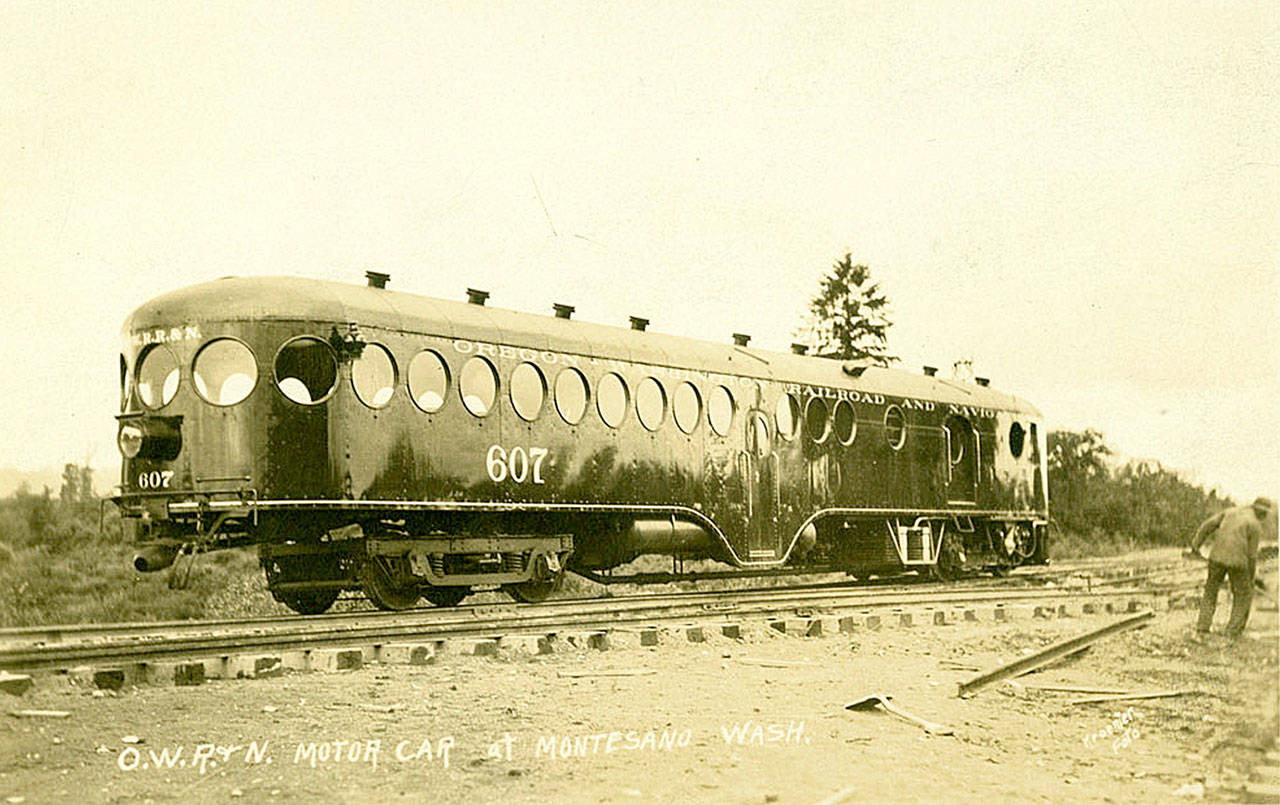Land-based mass transit has seen many changes on the Harbor since the earliest white settlers arrived some 150-years ago. While the first passenger train did arrive in Aberdeen in 1895, opening an age of rail travel connecting Harborites with the outside world, there were numerous attempts to create a system of travel within the confines of the county’s major towns. The first undertaking, in 1901, was the Gray’s Harbor Automobile & Omnibus Company which operated for about a week before its machine ran off the old plank road connecting Aberdeen and Hoquiam, injuring four passengers. The next attempt was much more successful when the Grays Harbor Railway & Light Company operated streetcar service between Aberdeen, Hoquiam and Cosmopolis from 1904 to 1932. Then, in 1912, a new, sleeker, mode of transport arrived on the scene with the addition of the McKeen Motor Car to the rail system.
The McKeen motor car was the first successful example of an all-steel, self-propelled train car in the world that did not rely on electricity or steam. Among the innovations it brought to modern travel was the placement of the door in the center of the car rather than on the end. This allowed passengers to escape in the event that both ends were crushed in a wreck.
Built by the McKeen Motor Car Company of Omaha, Nebraska, it was essentially a bus that ran on rails with an internal combustion gasoline engine which was more efficient than a standard steam train of the time. A single McKeen could do the job of a steam engine and two cars with half the crew. The engine took about 10-15 minutes to start up rather than the four hours it took to properly warm up a steam engine. The use of ship-like portholes for windows allowed for a less-obstructed view for passengers. The car was innovative with its aerodynamic design with a wind-cutting wedge on the front and a rounded rear end. The Grays Harbor machine was one of McKeen’s largest, weighing 37 tons and measuring 70 feet long, it had seating capacity for 52 passengers and cost $21,171.
The first use of the McKeen motor car in the northwest was in the Tacoma in 1910. It took another two years before it reached Grays Harbor but the inaugural run was front-page news along with the new town of McCleary:
GASOLINE MOTOR CAR INSTALLED — McCleary on the Map — Little Manufacturing Town Near Elma Gets Recognition of Railroad — Motor car service between Hoquiam and Aberdeen and Montesano, Elma and McCleary was begun yesterday morning, the torpedo-shaped motor car whizzed into this station. The car carried quite a crowd and on its return trip was well-patronized.
The service is the result of the work of J.B. Benson, well-known businessman, who saw the necessity of such a service and pointed it out to officials of the road, who made the investigation and found prospects sufficient to warrant the service being installed.
The fare from Aberdeen to any of the points remains the same as charges on the regular passenger trains.
The fare to McCleary is 85 cents and the round trip can be made in a half day.
The running time of the car is said to be 34.5 miles per hour, but its capacity is said to be 60 miles, which will enable the engineer to make up time when late.
The town of McCleary is located about nine miles from Elma, in what was formerly known by the name of Summit. During the early days the Northern Pacific ran its line from Kamilchie, a point on Puget Sound, across from Elma. The train ran between Montesano and Kamilchie and Summit was at the top of the divide between the Sound and the Chehalis River. People making the trip from Seattle or Tacoma to Aberdeen, were compelled to take the boat to Olympia, being taken later by another boat to Kamilchie, thence by train to Montesano and then by boat again to this city [Aberdeen].
The town is named after Henry McCleary, of the McCleary Lumber Company which firm operates a logging camp, saw and shingle mill. The company recently completed the largest door factory in the world, its capacity being 1,500 doors daily.
The company owns timber enough to last for years, and McCleary will figure as one of the most important working towns in Chehalis County in a few years. — Aberdeen Herald, February 19, 1912
The motor car ran here for several years before it was scrapped in July 1942 to supply metal for the war effort.
Roy Vataja is the son of Finnish immigrants and thinks it would have been pretty groovy to travel on one of these sleek machines.


